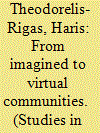| Srl | Item |
| 1 |
ID:
092320


|
|
|
|
|
| Publication |
2009.
|
| Summary/Abstract |
In considering how terrorist movements use the Internet, it is becoming increasingly apparent that we must move beyond predominantly descriptive overviews of the contents of websites to examine in more detail the notion of virtual communities of support and the functions of these for their members. Virtual communities in support of terrorist movements are real social spaces where people interact on a regular basis to disseminate their views, share their knowledge, and encourage each other to become increasingly supportive of movements that use terrorism to achieve their goals. Taken from a larger body of comparative qualitative research investigating the content and function of discourses created in virtual communities in support of terrorism, this article presents a thematic analysis of "Stormfront," a virtual community of the radical right.
|
|
|
|
|
|
|
|
|
|
|
|
|
|
|
|
| 2 |
ID:
120010


|
|
|
|
|
| Publication |
2013.
|
| Summary/Abstract |
The pivotal role played by Computer-Mediated Communications (CMCs) as mobilization tools for social movements as diverse as the 'Arab Spring', the Iranian 'Green Revolution', and the 2008 Greek 'December Riots', has rekindled academic interest in the internet as a field of sociological research. Drawing on new media and nationalism studies, this article approaches a particular type of CMC as a 'virtual community'. By examining the context of post-1999 Greek-Turkish reconciliation, it is argued that these virtual communities have offered significant breathing space for individuals who are ready to revisit, discuss, and negotiate the constitutive boundaries of modernity's 'imagined communities', and are therefore conducive to the Greek-Turkish rapprochement.
|
|
|
|
|
|
|
|
|
|
|
|
|
|
|
|